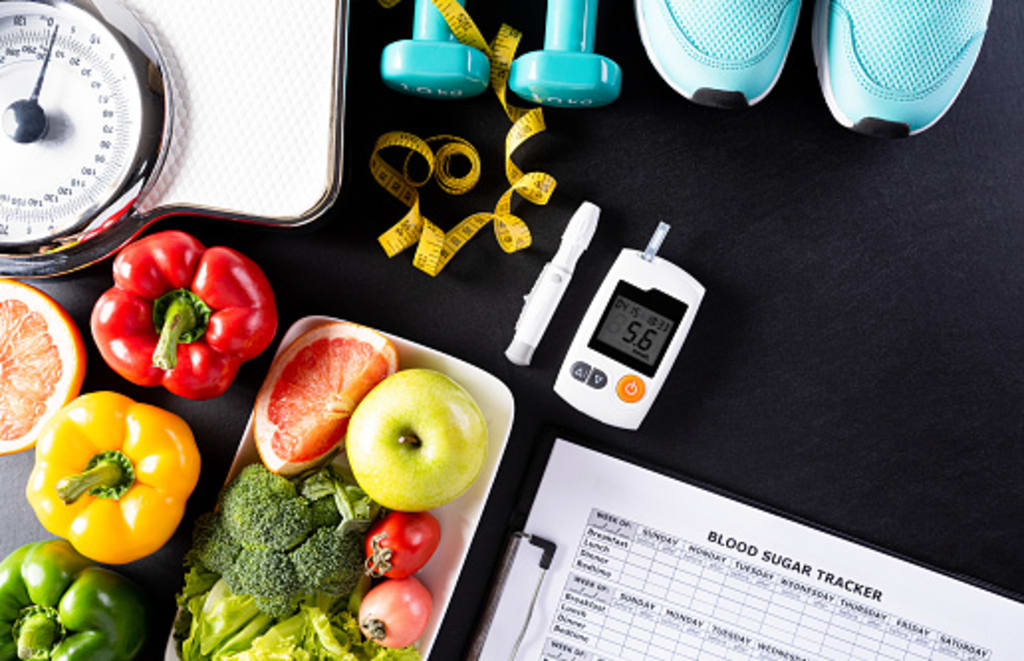My First Month with Type II Diabetes
I felt driven by a need to understand how I got here in order to figure out how to move forward.

"Do you want a few months to see if you can manage this with diet and exercise?" my doctor said first. She is well-versed in my personality. I was taken aback. She waited for me to respond, but I couldn't come up with anything.
"Your fasting blood sugar is 153, and your A1C is 7.1," my doctor said. She took a breath and stopped. "You're aware of the significance of this."
Indeed. I was well aware of what this meant. I was diagnosed with type 2 diabetes.
I'm well familiar with lab numbers and what they signify. As a former licensed professional midwife, I've helped a lot of pregnant women deal with gestational diabetes. I'm familiar with glucometers, blood sugar levels, diet diaries, and all of the lifestyle modifications that come with a diabetes diagnosis.
It entails significant modifications. It entails taking a hard look at myself and accepting the reality in difficult but necessary ways. It entails acknowledging that I have a chronic illness.
Research is my go-to method for dealing with difficult situations. I retired to my office as soon as I got off the phone with my doctor, where I could conduct a deep dive into type 2 diabetes.
I went to my neighborhood drugstore to get a glucometer, lancets, and test strips. It felt extremely real, very fast, to make my finger bleed numerous times a day to test my blood sugars.
I felt compelled to discover out how I got here in order to figure out how to proceed.
During the pandemic, I, like many others, had gained weight. I didn't do anything for months but walk from my bed to the kitchen to the computer. I even quit walking the dog in favor of driving to the dog park, where I could engage in socially distant conversations with other people.
I put the phone down. It took me three days to tell my girlfriend.
I gradually increased my pasta and bread consumption. Comfort foods were a way to infuse a little joy into a gloomy situation. I didn't shy away from the pleasures of chocolate after supper, relishing in little spurts of endorphins. I dealt with it, as did millions of others around the world. I hid in my cocoon. After that, I stayed in that state for 15 months.
Perhaps I should have known better, given my family's history of diabetes and heart disease. But I honestly didn't anticipate diabetes would make an appearance. I used to run 5K events just 5 years ago. My spouse and I were just reflecting on our fantastic health a few weeks ago.
It appears that I am not alone in having been diagnosed with type 2 diabetes during the pandemic.
Researchers are still tabulating and tracking data, but current estimates imply that the number of children diagnosed with diabetes has doubled since the COVID-19 pandemic began.
I don't know how long I've had the sickness because I didn't get a checkup for two years.
My age is also a factor. At 57, I'm in the peak age bracket for type 2 diabetes diagnosis. While I recognize that my body and mind will change as I get older, I am nevertheless tolerant of this abrupt transition into life with a chronic illness. This is an illness that I will have to deal with till I die. That is a sobering thought.
This is influenced by my weight. It turns out that weight is a better predictor of who will be diagnosed with diabetes than heredity. I'm roughly 60 pounds overweight, which may have made me more prone to type 2 diabetes.
The generation of insulin and how it is used are both affected by excess fat in the body. The good news is that if I can reduce 10% of my body weight, I might be able to stop this train in its tracks.Getting a Glimpse of the Emotional Impact
Nobody discusses the emotional toll that diabetes takes.
Because telling my sons about my condition makes it real, I haven't told them yet. I'm sure my announcement will cause them concern. I'll also warn them that it may increase their chances of having type 2 diabetes later in life.
I'll feel their eyes on me, pleading with me to poke my fingertips numerous times a day and to devote myself fully to the management it necessitates.
There's a part of me that is enraged as well. What is going on with me?
I'm embarrassed. Is it guilt, or something else? Many persons with type 2 diabetes feel ashamed and guilty about their condition. Every day, I fight the notion that this was a mistake on my part.
While the exact etiology of type 2 diabetes is unknown, I am aware that it is frequently caused by a mix of genetic and environmental factors. Diet, exercise, and stress all have a role, but so does chance.
I'm not going to waste any more time worrying about myself. I'm not going to delve into our family's past in the hopes of blaming my fate on heredity. I'm going to try to concentrate on what I can influence.
Begin with tiny adjustments.
I've only been here a few weeks and I'm already making adjustments.
I located the food scale and the measuring cups in the kitchen. Having it on the counter has served as a good reminder to reduce portion amounts.
I've stocked the fridge with the usual suspects: green vegetables, lean meats, low-glycemic fruits, and a few diet sodas in case I develop a severe sugar need.
I made a new playlist for the many hours of walking ahead of me, and I spoke with the dog, who is really happy with this change in his lifestyle.
I'm also giving myself permission to be a little giddy. I recall how good it felt to be in better shape, how good it felt to walk the dog for a few miles every morning.
I'm keeping track of my blood sugar levels in the hopes of uncovering patterns and identifying meals that cause me to spike. Although I shall miss ciabatta bread, I am reminded of how much I enjoy sweet potatoes.
Small steps, please. I'm sure there will be days when I don't walk a mile, and I'm sure I'll have a slice of pie around the holidays. I understand that this isn't an all-or-nothing scenario.
I'm allowing myself to make improvements that aren't ideal since even small steps forward are better than none at all.
Last but not least
What I'm concerned about right now is my recovery from the diagnosis. It's a job. Being a diabetic in a world that doesn't always comprehend what you're going through isn't easy. Work is the emotional weight.
I'm aware that there will be significant changes in the near future. I'm establishing new relationships with my body, food, and my doctor. I wouldn't call me content, but I am grateful. I have a decent chance of controlling this disease before it wreaks havoc on my nerves, eyes, or kidneys.
I've come to terms with the fact that I'll have to learn a new dance.





Comments
There are no comments for this story
Be the first to respond and start the conversation.